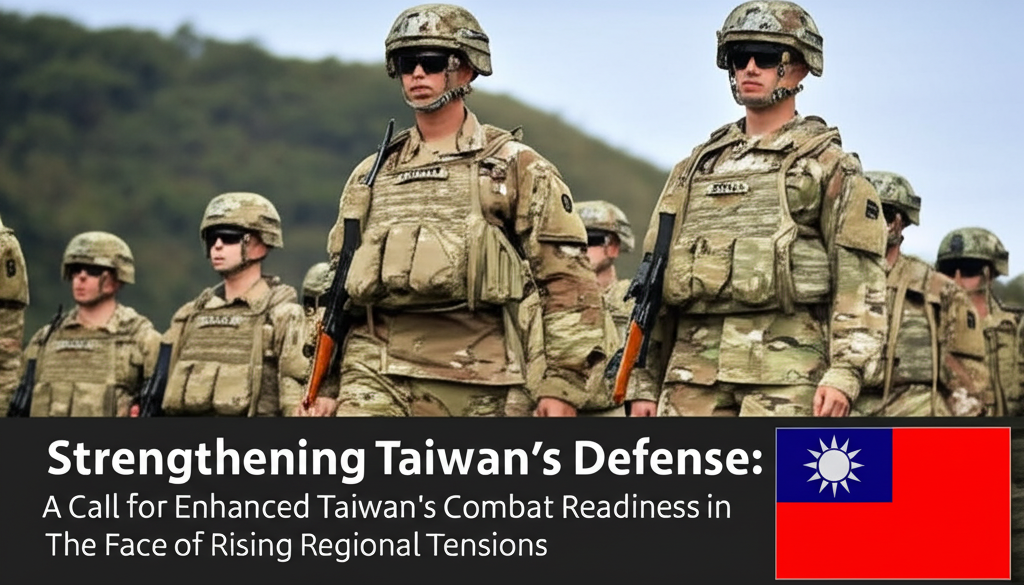Strengthening Taiwan's Defense: A Call for Enhanced US Military Training
US Experts Advocate for Bolstering Taiwan's Combat Readiness in the Face of Rising Regional Tensions

In a recent Senate Foreign Relations Committee hearing, Randall Schriver, former US assistant secretary of defense for Indo-Pacific security affairs, emphasized the critical need for the United States to "strengthen" the training of Taiwan's armed forces. This recommendation is aimed at enhancing their combat readiness and bolstering deterrence in the Taiwan Strait.
Schriver, now the chairman of the board at the Project 2049 Institute, highlighted the evolving nature of US involvement, noting a shift towards more direct engagement, including the training of Taiwanese military personnel. He underscored that such training, once a "taboo," is now essential to fostering a more professional and proficient military in Taiwan.
Schriver also suggested that the US should encourage Taiwan to modernize its command and control systems. He pointed to the need for the country to invest in unmanned and autonomous technologies across all domains, including underwater. This strategic focus aligns with the changing dynamics of modern warfare, enhancing Taiwan's ability to make effective battlefield decisions.
Further discussions at the hearing addressed broader regional strategies. Schriver, alongside US Senator Dave McCormick, highlighted the importance of developing the Philippines, particularly Northern Luzon, due to its strategic proximity to the Taiwan Strait. This builds on existing support, as the US military has discreetly aided in training Taiwan's forces for decades.
This long-standing support was acknowledged by then-minister of national defense Chiu Kuo-cheng (邱國正) who confirmed the rotation of US military personnel to train Taiwanese armed forces, including conscripts, with Taiwanese soldiers also receiving training in the US. However, specifics were kept confidential for security reasons.
The hearing, titled “Shared Threats: Indo-Pacific Alliances and Burden Sharing in Today’s Geopolitical Environment,” saw further comments from US Senator Jim Risch, chairman of the Senate Foreign Relations Committee. Risch emphasized the necessity for allies to work collaboratively to counter China's aggression. He encouraged the expansion of US basing and overflight access around the Indo-Pacific region to demonstrate collective strength and presence.
Addressing Taiwan's defense spending, Risch called for continued increases. However, Schriver urged a more nuanced perspective. While Taiwan's defense spending is at 2.5 percent of its GDP, he argued that its investments in resilience, communications, and civil defense should also be recognized. Schriver cited the Philippines as an example, which, despite lower defense spending, has facilitated US bases and strategic facilities through the Enhanced Defense Cooperation Agreement.
Other Versions
Fortalecimiento de la defensa de Taiwán: A Call for Enhanced US Military Training
Renforcer la défense de Taïwan : Appel au renforcement de la formation militaire américaine
Memperkuat Pertahanan Taiwan: Seruan untuk Meningkatkan Pelatihan Militer AS
Rafforzare la difesa di Taiwan: Un invito a migliorare l'addestramento militare degli Stati Uniti
台湾防衛の強化米軍訓練の強化を求める声
대만의 국방력 강화: 미군 훈련 강화에 대한 요구
Pagpapalakas sa Depensa ng Taiwan: Isang Panawagan para sa Mas Pinahusay na Pagsasanay Militar ng US
Укрепление обороны Тайваня: Призыв к расширенной военной подготовке США
การเสริมสร้างการป้องกันประเทศของไต้หวัน: เรียกร้องให้มีการฝึกทหารของสหรัฐฯ ที่เข้มข้นขึ
Tăng Cường Quốc Phòng Đài Loan: Kêu Gọi Nâng Cao Huấn Luyện Quân Sự Mỹ

